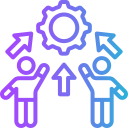
Enhancing Productivity in Remote Work Environments
Maximizing productivity in remote work environments is essential for organizations and individuals alike. As the shift toward distributed teams accelerates, understanding the strategies, tools, and cultural shifts needed to support effective remote work becomes crucial. This page explores key aspects of enhancing productivity in remote work settings, focusing on actionable insights, best practices, and the elements that foster a thriving work-from-anywhere culture.
Establishing Clear Communication Channels
Communication is the lifeblood of remote teams, and having explicit channels is essential for maintaining cohesion. Selecting the right mix of synchronous and asynchronous tools helps ensure everyone stays in the loop. Clearly defined communication protocols prevent misunderstandings and reduce delays. With structured meetings, messaging platforms, and clear guidelines, teams can share knowledge effectively, solve problems quickly, and maintain a sense of connection despite physical distances.
Defining Roles and Expectations
Clarity of roles and expectations mitigates confusion and keeps remote workers aligned with organizational goals. Detailed job descriptions, specific deliverables, and transparent performance metrics help employees understand what is required. Regular feedback and check-ins reinforce these expectations and allow for course correction. When everyone knows their responsibilities and how their work contributes to overall objectives, productivity soars, and accountability is strengthened.
Enabling Reliable Technology Infrastructure
A dependable technological foundation is vital for seamless remote operations. High-speed internet, cloud-based collaboration tools, and secure access to organizational systems enable remote workers to operate without interruption. Providing technical support and ensuring employees have the right equipment reduces downtime and frustration. An investment in resilient IT infrastructure not only keeps remote teams running smoothly but also builds trust in the remote work arrangement.

Building Trust and Autonomy
Trust is the foundation upon which all remote work productivity rests. Leaders must demonstrate faith in their teams by allowing autonomy in completing tasks. Moving away from micromanagement and embracing results-focused assessments encourages creativity and initiative. When employees feel trusted to manage their time and projects, they are more likely to be proactive, take ownership of their work, and deliver high-quality results.

Promoting Social Connection
Combatting the isolation that sometimes accompanies remote work is critical. Social bonds are nurtured through intentional virtual events, spontaneous conversations, and opportunities for team members to share personal milestones. Encouraging informal interactions fosters a sense of belonging and camaraderie, which, in turn, motivates individuals to collaborate more openly and support one another in achieving shared goals.

Emphasizing Recognition and Feedback
Recognition and constructive feedback are essential motivators in remote environments. Publicly acknowledging accomplishments, whether large or small, builds morale and encourages continued excellence. At the same time, timely, specific feedback provides direction for growth. An ingrained culture of appreciation and feedback helps employees feel valued and assured in their contributions, driving sustained engagement and performance.
Streamlining Workflows and Collaboration
Workflow automation eliminates repetitive manual tasks and streamlines processes for remote teams. By leveraging automation tools for tasks such as reminders, project tracking, and approvals, organizations free up employees’ time for more strategic and creative work. Automated workflows also enhance accuracy, reduce the risk of errors, and provide valuable data for continuous improvement, all of which are crucial for scaling productivity in virtual environments.
